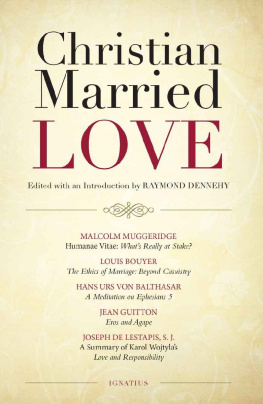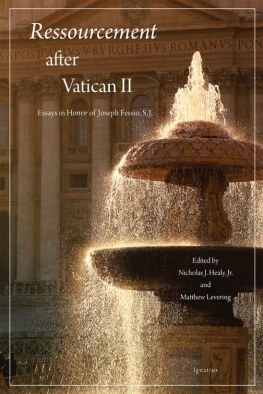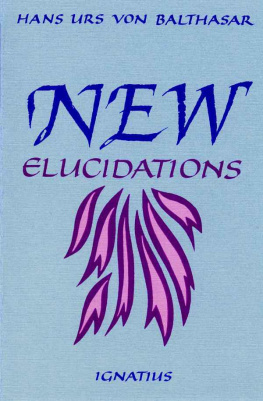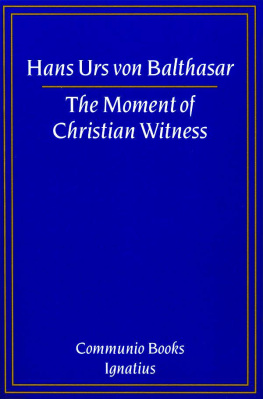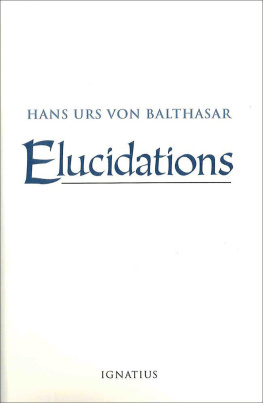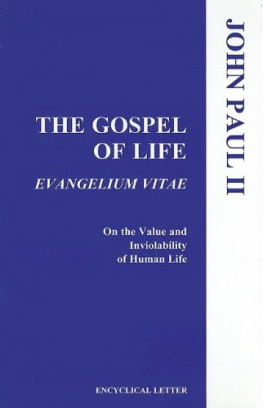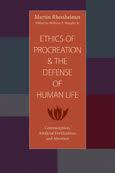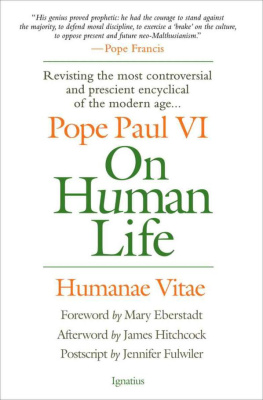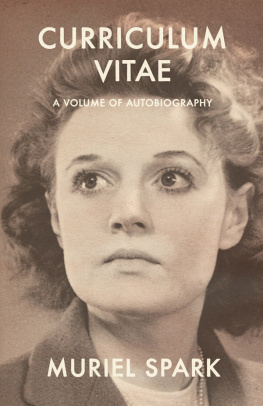Christian Married Love
CHRISTIAN
MARRIED
LOVE
EDITED BY RAYMOND DENNEHY
IGNATIUS PRESS SAN FRANCISCO
Cover design by Enrique J. Aguilar
With ecclesiastical approval
Ignatius Press, 1981
Reprinted in 2018
All rights reserved
ISBN 978-0-89870-008-4 (PB)
ISBN 978-1-64229-045-5 (EB)
Library of Congress Control Number 81-85047
Printed in the United States of America
Acknowledgments
The contributions by Malcolm Muggeridge, Fr. Hans Urs von Balthasar and Fr. Louis Bouyer were first delivered at the Symposium on Humanae Vitae , held at the University of San Francisco in July 1978 to commemorate the 10th anniversary of that encyclicals promulgation. Fr. von Balthasars address was translated by Erasmo Leiva.
A Summary of Karol Wojtylas Love and Responsibility was originally published in French, in numbers 39 and 40 of the Fiches Documentaires de CLER (Centre de Liaison des Equipes de Recherche ). The CLER is part of the French Family Life Bureau ( Pastorale Familiale Franaise ). It is engaged in the education, from a perspective that is fully human, of young people and couples concerning love and sexuality and particularly in matters pertaining to the regulation of birth and to marital problems. CLER is a founding member of International Family Life Promotion (IFLP).
Eros and Agape first appeared in Revue Amour et Famille (Jan.-Feb., 1971). This essay and Fr. de Lestapis summary of Love and Responsibility were translated by Sr. Sergia Englund, O.C.D.
Contents
RAYMOND DENNEHY
MALCOLM MUGGERIDGE
LOUIS BOUYER
HANS URS VON BALTHASAR
JEAN GUITTON
JOSEPH DE LESTAPIS, S.J.
Introduction
The fact that the contributors to this book are either theologians or Catholic philosophers or, in the case of Mr. Muggeridge, a journalist who is a born again Christian deserves comment. Insofar as the birth control controversy concerns the transmission of human life itself, it is too fundamental a topic to be confined to theology or even to religion. Anything that affects human life so profoundly as the manner of controlling its transmission is bound to have an equally profound effect on everything which depends on there being human life in the first place: morals, society, politics, science, art, philosophy, religion and, in fact, all of civilization. Thus there can be no doubt that the birth control controversy is a matter of concern for social scientists, secular philosophers, politicians and all who are committed to protecting and promoting human progress. I am here, of course, speaking of the rightfulness of those whose disciplines are formally outside the provinces of theology and religion to investigate and pronounce on birth control and related matters; the pronouncements of demographers and social scientists as well as the policies of politicians and nations, irrespective of their truthfulness or responsibility, have already established the fact of their presence in the controversy. But there is a fundamental sense in which the controversy belongs primarily within the provinces of theology and religion.
It is impossible to understand the significance which the Western world attaches to the human sex act apart from the context of the Judeo-Christian tradition. The dignity that this tradition sees in human sexuality has its explanation in the fact that it is regarded as the creaturely analogue of the creative power of God. Having made man and woman in his own image and likeness, he invites them to participate in his providence. In the sex act, they cooperate with him in the creation of a new human life. In doing so, they are also called upon to take responsibility for that life. Thus the sex act is a participation in Gods fatherly concern for his creatures, as well as in his creative power, because parental love is at once protective and respectful of the childs freedom and integrity. Like Gods love for man, then, parental love must risk rejection, misunderstanding and even ridicule. The lovers are vulnerable at the hands of both the beloved and the world. Yet, insofar as their sex act remains open to procreation, they freely accept this risk. But the willingness to accept risk is quite understandable in terms of the principle, The good is diffusive. Just as God, who is supremely good, freely created the world in generosity and love for the creatures he would bring into existence, so the Judeo-Christian tradition views the sex act as an expression of love and generosity.
It is at this point that the Churchs insistence on the impossibility of separating the unitive and procreative aspects of the sex act derives its intelligibility. For this is the act in which a man and a woman express their mutual love and in so doing donate themselves to each other in such a way as to procreate another human being. Because love is by its nature creative, the expression of their love for each other, which the act makes possible in a unique way, is inextricably tied to that acts openness to procreation. Thus, as Cahal Daly observes, to say that in marriage a man and a woman become two in one flesh is not simply to speak metaphorically; it is to state a literal truth as well. Their love is incarnated in the child. Even from a purely biological standpoint, the child gets twenty-three chromosomes from each parent. Thus, even though the child is a person and accordingly in his uniqueness is more than the sum of parental contributions, it is nevertheless true to say that in an important sense he gets his being from his parents. Since he is the embodiment of their love for each other and since this love is a donating of self, each to the other, we may fairly say that it is in him that they actually become two in one flesh. Indeed, as Daly further observes, this expression of their love will endure forever because the child is a person and, as such, is destined by God to live for eternity. This becoming two in one flesh is also verified on the dynamic level of day-to-day family relations. It is impossible to assess the husbands and wifes love for each other apart from their love for the child, while in turn their love for him cannot properly be assessed apart from their love for each other.
It is in the dogma of the Trinity, however, that we find the highest and most influential model for the sexual union between man and woman. Only in the Trinity is there love so perfect that the Lovers communiontheir respective donation of selvesis so perfect that the result is perfect unity, one God; and yet, because donation is an act that can be performed only by persons, their love preserves the uniqueness of the three persons, Father, Son and Holy Spirit. Because love is fruitful and because the love between the Father and the Son is a perfect love, it is the most perfectly fruitful of all love: its issue is the Holy Spirit. Thus modeled as it is after the holy Trinity, the conception of love between man and woman, as it has permeated the West and its institutions, is a love that is unitive without being destructive of the unique selfhood of each, and is also creativeit results in a new human person. And just as the love between the Father and the Son could not exist apart from the issue of the Holy Spirit, so the unitive and procreative aspects of human love cannot be separated. Indeed, just as the divine love is essentially and thus eternally trinitarian, so is the love among man, woman and offspring; for, as noted above, one cannot properly understand the love between man and woman apart from their love for their child and vice versa. In this mutual expression of a love that in its superabundance overflows to create a new person, both the man and the woman enjoy a self-fulfillment that they could not otherwise enjoy; for their growth in love for each other and their personal growth are uniquely dependent on the love and care they have for their child.
Next page
